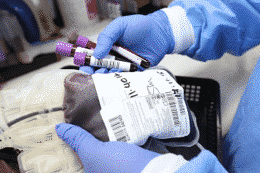
As of 2020, the FDA has finally lifted the ban on blood donation by service members who served in Europe between 1980 and 1996, even more veterans can give back to their communities and help fellow service members by donating blood as often as allowed, every 56 days.
As a veteran, you probably want to give blood to save lives — and just a single pint of your blood can save as many as three lives, but that’s not the only reason you should be giving blood. Donating blood regularly can lower your risk of having a heart attack, developing heart disease, developing liver disease, developing metabolic disorders like diabetes, and even suffering major organ failure. You’ll also benefit from the psychological health effects of donating blood — you’ll feel happier and better about yourself, less prone to depression and loneliness. Let’s take a look at some of the things donating blood can do for you, the donor.
Keep Your Heart Healthy
It might seem counterintuitive, but giving blood as infrequently as once a year can have huge benefits for your heart health. Researchers have long known that donating blood can prevent heart attacks, lowering your chances of one by as much as 88 percent. That’s because if you have any excess iron in your blood, your body will store it in major organs like the heart, which can contribute to heart disease. Iron in your blood can cause your blood vessels to contract, raising your blood pressure and your risk of a heart attack, because it’s easier for constricted blood vessels to get blocked by arterial plaque.
Prevent Liver Disease and Metabolic Disorders
Your body also stores excess iron in the liver and pancreas, two organs closely linked to metabolic function. An excess of iron in your liver can cause cirrhosis, non-alcoholic fatty liver disease (NAFLD), and other liver diseases. It can even be a factor in viral liver infections, like hepatitis C. Iron buildup in your pancreas can contribute to the development of diabetes, and because excess iron can also affect your pituitary glands, adrenal glands, and other parts of your endocrine system, other metabolic effects can occur. Having some of your blood regularly removed can reduce the amount of iron in your body, and mitigate dangerous iron accumulation in organs like your liver, pancreas, and other organs and glands.
Stave Off Cancer
When you go to give blood, cancer is probably the last thing on your mind. And it’s true that, if you’re perfectly healthy, giving blood won’t lower your cancer risk by more than a few percentage points. But many people have conditions, like peripheral arterial disease (PAD) or hemochromatosis, which can be risk factors for cancer. Iron is an oxidizing free radical that can do damage to your cells, so removing some of the iron from your body regularly, via blood donation, can mitigate some of that oxygenating effect and protect you from many cancers.

Protect Your Mental Health
As a veteran, you understand better than most just how precious good mental health can be. And while you shouldn’t rely on donating blood alone to treat a diagnosed mental disorder, the act of giving blood can definitely have a protective effect on your mental health.
When you give blood, you’re getting out of the house, getting some human contact with staff and donors at the blood bank, and doing a good deed to help your fellow man. The act of helping others in and of itself can be enough to generate feelings of self-worth, boost your mood, and lower stress. In fact, research suggests that helping others is a stronger predictor of good mental health than only receiving help from others.
Giving blood can help you manage stress and anxiety, and can protect you from depression. It may surprise you to learn that giving blood can also mitigate loneliness. That’s because it gives you an excuse to go and interact with other humans in a casual way — and the sort of casual acquaintanceships you form by going to the blood bank to give a pint every two months are more important to your mental health and wellbeing than you might think. What scientists call “weak ties” — the superficial friendships we have with people like the mailman or the waitress at your favorite diner — can do a lot to help you feel like a valued member of the community.
Giving blood is always the right thing to do, even if you only do it once in a while. But the more often you give, the better you’ll feel about yourself and your community — and, of course, the more lives you could save.
ATTENTION READERS
We See The World From All Sides and Want YOU To Be Fully InformedIn fact, intentional disinformation is a disgraceful scourge in media today. So to assuage any possible errant incorrect information posted herein, we strongly encourage you to seek corroboration from other non-VT sources before forming an educated opinion.
About VT - Policies & Disclosures - Comment Policy



